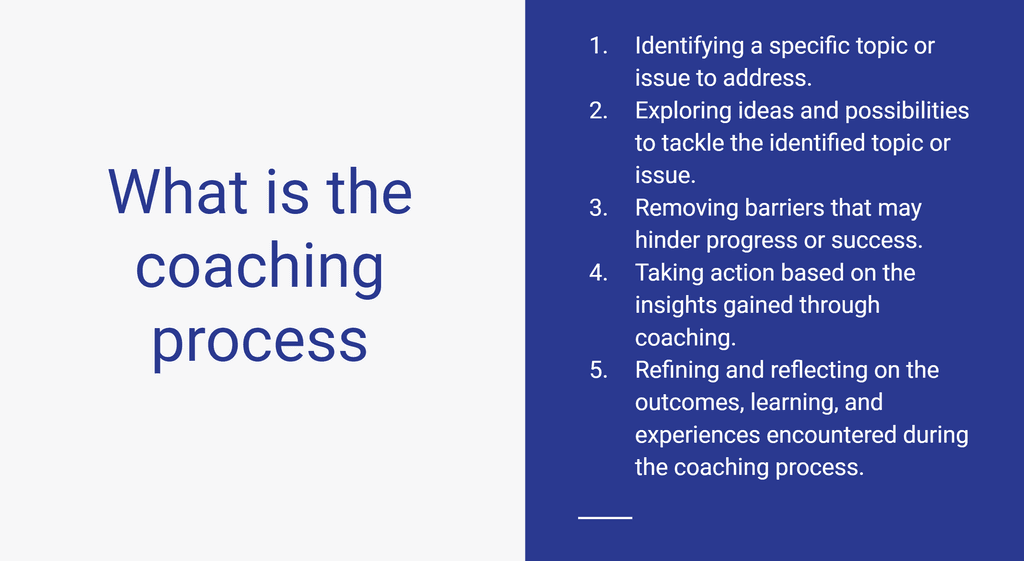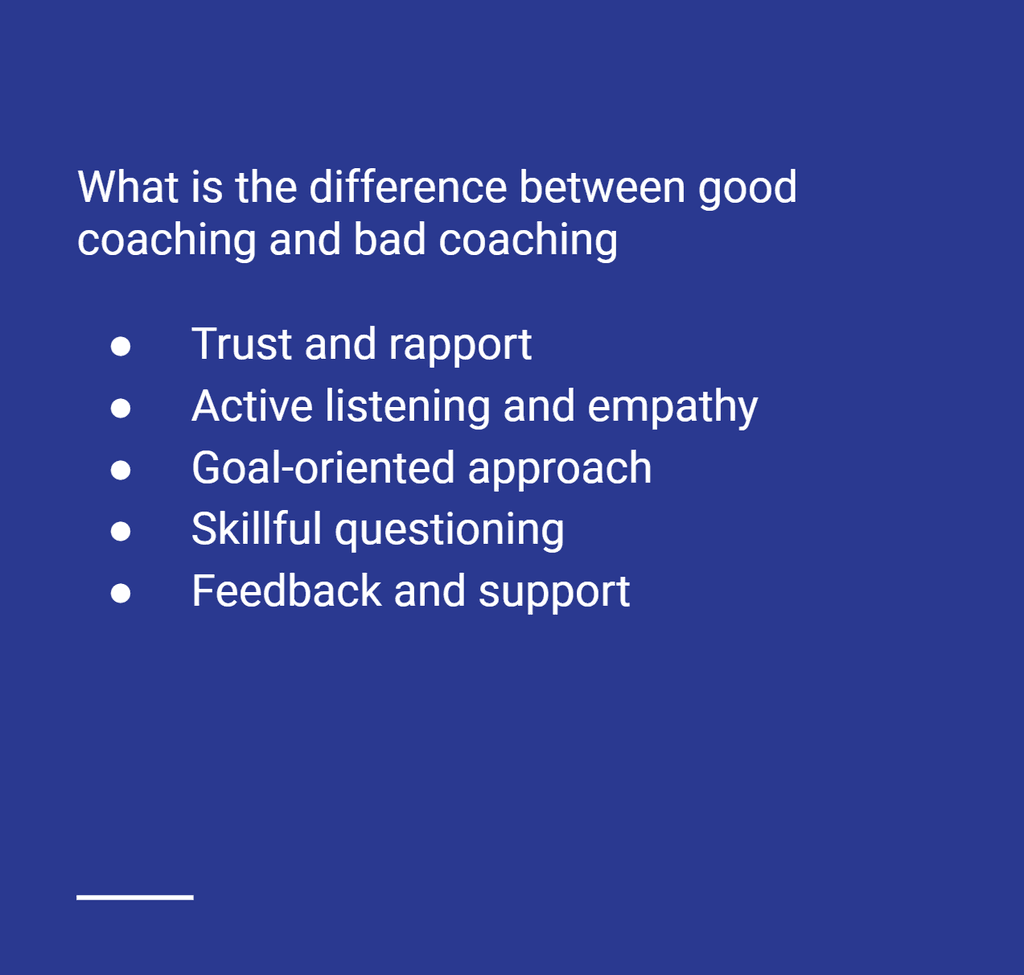What is coaching
Coaching is a methodology used to train, counsel, or instruct individuals or groups on developing skills to enhance productivity or overcome performance challenges. In this process, a supervisor takes on the role of a coach, while the learner is referred to as the coachee.
Coaching involves various methods and models that emphasize close observation, accountability, and providing feedback on progress and performance.
What is the coaching process
The coaching process encompasses the following steps:
- Identifying a specific topic or issue to address.
- Exploring ideas and possibilities to tackle the identified topic or issue.
- Removing barriers that may hinder progress or success.
- Taking action based on the insights gained through coaching.
Refining and reflecting on the outcomes, learning, and experiences encountered during the coaching process.

What are the different types of coaching
There are two main types of coaching:
- Internal coaching: This occurs within an organization, where a manager assumes the role of a coach for a team they are already familiar with.
- External coaching: In this approach, the coach is not part of the organization or its line management structure but possesses expertise in the relevant field for which coaching is being provided.
What benefits coaching offers
Coaching offers several benefits, including:
- Fine-tuning skills to achieve higher levels of proficiency.
- Accelerating the learning process by providing targeted guidance and support.
- Resolving issues or challenges that may impede progress.
- Developing peak performance by unlocking potential and maximizing abilities.
- Engaging in strategic planning to set and achieve goals effectively.
- Facilitating change by supporting individuals or teams through transitional phases.
- Identifying and clarifying goals for personal or professional growth.
In summary, coaching serves as a valuable tool for empowering individuals or groups to improve their performance, overcome obstacles, and reach their full potential.
What is the difference between good coaching and bad coaching
Good coaching: Good coaching is characterized by several key factors that contribute to its effectiveness:
-
Trust and rapport: A good coach establishes a trusting and supportive relationship with the coachee. This creates a safe environment for open communication, vulnerability, and personal growth.
-
Active listening and empathy: A good coach listens attentively, seeks to understand the coachee's perspective, and demonstrates empathy. They show genuine interest in the coachee's challenges, feelings, and aspirations.
-
Goal-oriented approach: A good coach helps the coachee define clear and specific goals. They assist in developing action plans and provide guidance to help the coachee achieve those goals.
-
Skillful questioning: A good coach asks thought-provoking questions to encourage reflection, stimulate critical thinking, and deepen self-awareness. They guide the coachee to discover insights and solutions on their own.
-
Feedback and support: A good coach provides constructive feedback to the coachee, highlighting strengths and areas for improvement. They offer encouragement, support, and accountability throughout the coaching journey.

Bad coaching: Conversely, bad coaching may lack the necessary qualities and approach needed for a productive coaching experience:
- Lack of trust and rapport: A bad coach fails to establish a trusting relationship with the coachee, hindering open and honest communication.
- Poor listening and empathy: A bad coach may not actively listen or demonstrate understanding, making the coachee feel unheard or misunderstood.
- Lack of goal clarity: A bad coach may not assist the coachee in setting clear goals or developing actionable plans. This can lead to a lack of direction and progress.
- Ineffective questioning: A bad coach may ask irrelevant or leading questions, stifling the coachee's self-discovery and limiting potential growth.
- Lack of feedback and support: A bad coach may provide inadequate feedback or fail to offer support and encouragement. This can leave the coachee feeling unsupported and demotivated.
It's important to note that coaching approaches may vary, and what works well for one coachee may not be as effective for another. However, the principles of trust, active listening, goal orientation, skillful questioning, and constructive feedback generally contribute to a positive coaching experience.
Top tips for good coaching
Here are some good tips that can lead to good coaching
- Build rapport and establish trust: Focus on creating a safe and supportive environment where the coachee feels comfortable sharing openly. Foster a trusting relationship through active listening, empathy, and confidentiality.
- Clarify goals and expectations: Work collaboratively with the coachee to define clear and specific goals. Ensure alignment between their aspirations and the coaching objectives. Set realistic expectations and establish a roadmap for the coaching journey.
- Practice active listening: Listen attentively and without judgment. Pay attention to verbal and non-verbal cues. Seek to understand the coachee's perspective fully. Reflect back their thoughts and feelings to demonstrate active engagement.
- Ask powerful questions: Use open-ended and thought-provoking questions to encourage reflection, expand awareness, and stimulate new insights. Guide the coachee towards self-discovery and encourage them to explore different perspectives.
- Provide constructive feedback: Offer specific and actionable feedback that focuses on strengths, areas for improvement, and developmental opportunities. Balance positive reinforcement with suggestions for growth, always maintaining a supportive tone.
- Encourage self-reflection: Foster introspection by encouraging the coachee to examine their beliefs, assumptions, and behaviors. Help them explore how these factors impact their goals and performance.
- Support action planning: Assist the coachee in developing concrete action plans to achieve their goals. Break down objectives into manageable steps and encourage accountability for follow-through. Provide guidance and resources as needed.
- Cultivate a growth mindset: Foster a mindset of continuous learning and development. Encourage the coachee to embrace challenges, view setbacks as opportunities for growth, and cultivate resilience in the face of obstacles.
- Celebrate progress and successes: Acknowledge and celebrate milestones and achievements along the coaching journey. Recognize the coachee's efforts and successes to reinforce positive momentum and motivation.
- Foster ongoing learning and reflection: Encourage the coachee to reflect on their progress, lessons learned, and insights gained from the coaching experience. Support them in integrating new skills and behaviors into their daily lives beyond the coaching relationship.
Remember, effective coaching is a dynamic process that requires adaptability and responsiveness to the unique needs of each coachee. By incorporating these tips into your coaching practice, you can create a nurturing and empowering environment for growth and development.
Written by Sarah Thompson👩

Sarah is a highly experienced HR writer and consultant with over 15 years of industry expertise. Known for her ability to simplify complex HR concepts, Sarah provides clear and concise content that empowers organizations to develop effective people strategies. With a strong background in talent acquisition, employee engagement, performance management, and HR policy design, she offers tailored recommendations and practical solutions to optimize organizational effectiveness. Sarah's thought leadership, published articles, and consulting work have made her a respected figure in the HR community. Her passion for mentoring aspiring HR professionals and giving back to the community reflects her commitment to workforce development and empowerment.
